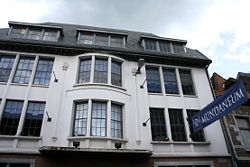- Mundaneum
-
The Mundaneum was an institution created in 1910 out of the initiative of two Belgian lawyers Paul Otlet and Henri La Fontaine as part of their documentation science. It aimed to gather together all the world's knowledge and classify it according to a system they developed called the Universal Decimal Classification. Otlet and La Fontaine organized an International Conference of International Associations which caused the creation of the Union of International Associations (UIA).
Otlet regarded the project as the centerpiece of a new 'world city'—a centrepiece which eventually became an archive with more than 12 million index cards and documents. Some consider it a forerunner of the internet (or, perhaps more appropriately, of systematic knowledge projects such as Wikipedia and WolframAlpha) and Otlet himself had dreams that one day, somehow, all the information he collected could be accessed by people from the comfort of their own homes.
The Mundaneum was originally housed at the Palais du Cinquantenaire in Brussels (Belgium). The Mundaneum has since been relocated to a converted 1930s department store in Mons (Wallonia).
An English pamphlet published in 1914 contains this description:
The International Centre organises collections of world-wide importance. These collections are the International Museum, the International Library, the International Bibliographic Catalogue and the Universal Documentary Archives. These collections are conceived as parts of one universal body of documentation, as an encyclopedic survey of human knowledge, as an enormous intellectual warehouse of books, documents, catalogues and scientific objects. Established according to standardized methods, they are formed by assembling cooperative everything that the participating associations may gather or classify. Closely consolidated and coordinated in all of their parts and enriched by duplicates of all private works wherever undertaken, these collections will tend progressively to constitute a permanent and complete representation of the entire world. (Union of International Associations, 1914, p. 116).[1]
Otlet commissioned architect Le Corbusier to design a Mundaneum project to be built in Geneva, Switzerland in 1929. Although never built, the project triggered The Mundaneum Affair, a theoretical argument between Corbusier and Czech critic Karel Teige.
The Mundaneum is featured in Wolfram’s Timeline of Systematic Data and the Development of Computable Knowledge, which marks many significant milestones in the history of data collection and management. [2]
Contents
See also
- Documentation science
- As We May Think, an essay by Vannevar Bush
- Project Xanadu, the first hypertext system founded in 1960 by Ted Nelson
- Memex, a portmanteau given by Vannevar Bush to the theoretical proto-hypertext computer system
- MyLifeBits
- People
- Andries van Dam
- Douglas Engelbart
- J.C.R. Licklider
- Ted Nelson
- Paul Otlet, considered one of the fathers of information science, helped established the Mundaneum and created the Universal Decimal Classification
- Tim Berners-Lee
- Vannevar Bush
- Ideas
- External memory
- Hypermedia
- Hypertext
- Intelligence amplification
- Office of the future
- Victorian Internet, term coined to describe advanced 19th century telecommunications technologies such as the telegraph
- World Wide Web
References
- ^ W. Boyd Rayward Visions of Xanadu: Paul Otlet (1868-1944) and Hypertext JASIS 45 (1994):235-250
- ^ http://www.wolframalpha.com/docs/timeline/computable-knowledge-history-5.html
Additional sources
- Rayward's Otlet Page: Paul Otlet and Documentation
- World of Learning and a Virtual Library Barry James, International Herald Tribune, June 27 1998.
- Histories: When the internet was made of paper Paul Collins, NewScientist, 22 March 22 2008.
- The Web that time forgot Alex Wright, The New York Times, June 17 2008.
- Architectures of Global Knowledge: The Mundaneum and the World Wide Web Charles van den Heuvel, Destination Library 15, 2008.
External links
- Official website of Mundaneum museum in Mons, Belgium (French)
Categories:- Archives in Belgium
- Museums in Brussels
- Visitor attractions in Brussels
- Mons
- Buildings and structures in Hainaut (province)
- Classification systems
- Science studies
- History of the Internet
- History of computing
- History of human–computer interaction
- Multimodal interaction
Wikimedia Foundation. 2010.

